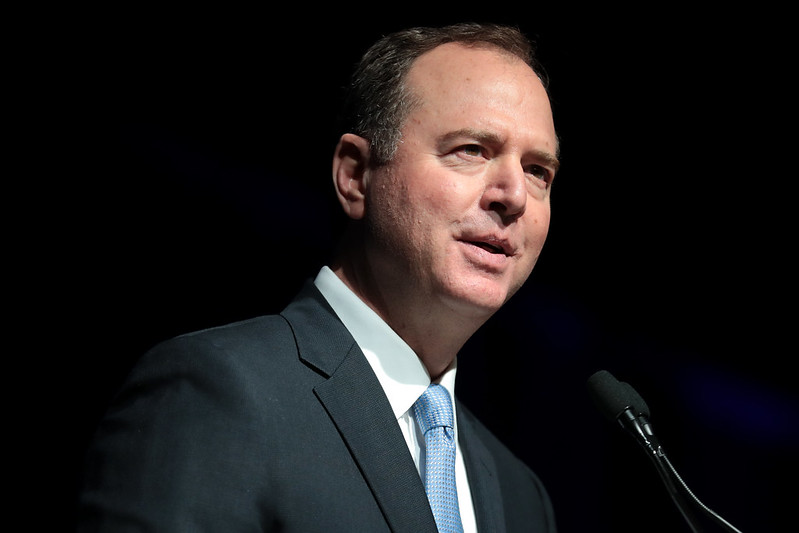What the House Has Planned on Impeachment This Week
The House of Representatives is out of session this week and is not scheduled to return until Oct. 15. Most members are back in their districts—and many of them will be explaining to their constituents their position on the House’s impeachment inquiry, which picked up serious steam last week in the wake of news about the president’s conversation with Ukrainian President Volodymyr Zelensky. But several House committees—Intelligence, Foreign Affairs, and Oversight and Reform—are nonetheless energetically engaged in gathering statements and evidence in support of the impeachment inquiry.

Published by The Lawfare Institute
in Cooperation With

The House of Representatives is out of session this week and is not scheduled to return until Oct. 15. Most members are back in their districts—and many of them will be explaining to their constituents their position on the House’s impeachment inquiry, which picked up serious steam last week in the wake of news about the president’s conversation with Ukrainian President Volodymyr Zelensky. But several House committees—Intelligence, Foreign Affairs, and Oversight and Reform—are nonetheless energetically engaged in gathering statements and evidence in support of the impeachment inquiry.
Suffice to say there’s a lot going on. The next month is likely to be a busy one—so before things get underway, it’s useful to take a look at everything the three committees have planned for the week ahead, and everyone they are hoping to speak to, relating to the ongoing impeachment inquiry.
Secretary of State Mike Pompeo
On Sept. 27, Rep. Eliot Engel, the chairman of the Committee on Foreign Affairs; Rep. Adam Schiff, the chairman of the Intelligence Committee; and Rep. Elijah Cummings, the chairman of the Committee on Oversight and Reform, sent a subpoena to Secretary of State Mike Pompeo for documents due by Oct. 4. The letter specifies, “Your failure or refusal to comply with the subpoena shall constitute evidence of obstruction of the House’s impeachment inquiry.” While the letter notes news reports and details in the whistleblower complaint indicating the State Department’s involvement in Rudy Giuliani’s activities in Ukraine, the subpoena is particularly noteworthy given the Wall Street Journal’s report on Sept. 30 that Pompeo participated personally in the Trump-Zelensky call. The State Department will likely indicate soon whether, or how, Pompeo will comply with the subpoena.
Amb. Marie Yovanovitch
On Oct. 11, the House Intelligence, Foreign Affairs, and Oversight and Reform Committees will jointly depose Marie Yovanovitch, the former U.S. ambassador to Ukraine. The deposition will take place behind closed doors, so it is unclear what the public may learn and in what time frame information will become available.
Yovanovitch is a decorated, 33-year career foreign service officer who served as the U.S. ambassador in Kyiv, Ukraine, from August 2016 through May 2019, when she was summarily dismissed from the post a few months prior to the end of her appointed term. During her time in Kyiv she became a target of criticism from Giuliani, who accused her of involvement in an alleged conspiracy to expose information damaging to the Trump campaign in 2016. In the call memo of the conversation between Trump and Zelensky, Trump asked the Ukrainian president to connect with Giuliani, stating that Yovanovitch was “bad news” and that “she’s going to go through some things.”
Additionally, the whistleblower complaint includes information about a March 2019 series of articles in The Hill that featured then-Ukrainian Prosecutor General Yuriy Lutsenko making allegations against other Ukrainian and U.S. officials. Among Lutsenko’s comments was that Yovanovitch—who had criticized Lutsenko for his poor record on fighting corruption—had allegedly obstructed the pursuit of corruption cases by Ukrainian law enforcement agencies. Specifically, the articles in The Hill alleged that Yovanovitch had provided Lutsenko a “do not prosecute” list and had blocked Ukrainian prosecutors from traveling to the United States expressly to prevent them from delivering “evidence” about supposed Ukrainian interference in the 2016 U.S. election. (The State Department expressly rejected the assertion at the time. Lutsenko later told a Ukrainian news outlet that Yovanovitch had never provided such a list and that actually Lutsenko was the one who requested it from her.)
The whistleblower complaint also notes the view of several U.S. officials that Yovanovitch’s tour was curtailed because of pressure stemming from Lutsenko’s allegations. Many on the right seized on Lutsenko’s comments to criticize Yovanovitch: On March 24, Donald Trump Jr. tweeted that Yovanovitch was a “joker” and linked to an article in the Daily Wire headlined “Calls Grow to Remove Obama’s U.S. Ambassador to Ukraine.” Former federal prosecutor Joe diGenova—who we now know was working for Giuliani on his efforts to get dirt on former Vice President Joe Biden—said on Fox that she had “bad mouthed the President of the United States to Ukrainian officials.” On May 14, in an interview with a Ukrainian journalist, Giuliani stated that Yovanovitch was “removed … because she was part of the efforts against the President.”
Yovanovitch’s removal did not garner much high-profile press in the United States at the time, though Democratic Majority Leader Steny Hoyer and Foreign Affairs Chairman Engel wrote to Pompeo at the time pressing for information and calling her firing a “political hit job.” Many in the U.S. diplomatic community voiced concern, believing she had been improperly removed at a critical moment, just as Zelensky took office.
Former Special Envoy Kurt Volker
On Oct. 3, the same three committees will jointly depose Kurt Volker, the former U.S. special envoy to Ukraine who resigned his post on Sept. 27. Again, the deposition will take place behind closed doors.
Volker, who has held various positions in government and served as a legislative aide to Sen. John McCain, is the executive director of the McCain Institute for International Leadership. In 2017, then-Secretary of State Rex Tillerson appointed Volker to serve on a part-time basis as the first U.S. special representative for Ukraine negotiations. The position reports directly to the secretary of state and was created to help Ukraine resolve its armed confrontation with Russia-sponsored separatists in the country’s east.
The call memo of the conversation between Trump and Zelensky does not mention Volker, but the whistleblower complaint does. Specifically, the complaint says that Volker visited Kyiv on July 26—one day after the Trump-Zelensky call—and met with Zelensky and other Ukrainian political figures, along with U.S. Ambassador to the European Union Gordon Sondland. According to the complaint, Volker and Sondland “had spoken with Mr. Giuliani in an attempt to ‘contain the damage’ to U.S. national security” and “sought to help Ukrainian leaders understand and respond to the differing messages they were receiving from official U.S. channels on the one hand, and from Mr. Giuliani on the other.”
In addition, Giuliani has gone on various news shows over the past few days and shown audiences messages, including texts, from Volker in an effort to demonstrate that his activities were sanctioned by the State Department. Among other things, Giuliani said, “Volker and Sondland congratulated me for what I was doing.… [Volker] should step forward and explain what he did.” Following these appearances by Giuliani, and news that the committees would seek his deposition, Volker resigned.
The most sympathetic explanation offered so far for Volker’s activities comes from Jackson Diehl of the Washington Post:
Some thought it best to simply keep Trump away from Ukraine. But then the State Department came up with a classic State Department solution: Organize talks. If Giuliani could be peeled away from Lutsenko, officials reasoned, and Trump could hear for himself how committed Zelensky was to fighting corruption, they might shift their views. Kurt Volker, a veteran diplomat who was State’s special envoy for Ukraine, set up conversations between Giuliani and a close aide to Zelensky. Volker also pushed for a phone call between Trump and Zelensky. The idea was that Zelensky would talk about his plan to “drain the swamp” in Kiev and Trump would then offer him the visit to the White House that the Ukrainian badly wanted.
The problem is that the pros misread Trump. He had no genuine interest in Ukrainian corruption. He simply wanted to squeeze the Ukrainians for the dirt on Biden and the Democrats that Giuliani said they had. The result was the disastrous July 25 phone call, which led to the whistleblower’s complaint and may yet lead to Trump’s impeachment.
The committees will likely want to know what Volker knew of the July 25 call and to what extent he was working with Giuliani.
Intelligence Community Inspector General Michael Atkinson
On Oct. 4, the House Intelligence Committee will reportedly hold another closed briefing with Intelligence Community Inspector General Michael Atkinson, who originally found the whistleblower complaint to be credible and of “urgent concern” under the Intelligence Community Whistleblower Protection Act (ICWPA) of 1998. Atkinson spoke to the committee in closed session on Sept. 19 but refused to discuss the contents of the whistleblower complaint. The complaint was released on Sept. 26, so presumably Atkinson will be much freer now to discuss his views, his own investigation to determine the credibility of the complaint and the actions of other executive branch officials in response to the complaint.
What’s Next?
Today, Pompeo tweeted a copy of a letter he wrote to the committee chairmen indicating his view that the letter requesting the depositions of current and former officials contains “significant legal and procedural concerns.” So whether the depositions will go ahead as planned is in question. One possibility is that one or more of the officials could choose to appear voluntarily despite Pompeo’s views. It is also possible that the committee will go ahead and issue subpoenas compelling their appearance.
The chairmen have also indicated that they have scheduled depositions of Deputy Assistant Secretary of State for European and Eurasian Affairs George Kent (Oct. 7), State Department Counselor T. Ulrich Brechbuhl (Oct. 8) and Sondland (Oct. 10). Brechbuhl and Sondland are mentioned by name in the whistleblower complaint; Kent is not.
Kent, a career foreign service officer, served as the deputy chief of mission—the second-highest-ranking official—in the U.S. Embassy in Ukraine from 2015 to 2018. Before that, he was the senior anti-corruption coordinator in the State Department’s Bureau of European and Eurasian Affairs. He traveled to Ukraine around May 8, just after the Trump administration recalled Yovanovich. He traveled to Ukraine again around Aug. 5.
Brechbuhl is a longtime personal friend and colleague of Pompeo, who brought him onboard at the State Department to serve as counselor—a position not subject to confirmation by the Senate. According to the State Department’s website, Brechbuhl provides strategic guidance to the secretary on foreign policy, undertakes efforts to enhance U.S. diplomacy and public outreach, and conducts special diplomatic assignments as directed by the secretary. Pompeo has relied on Brechbuhl to fulfill chief-of-staff duties at the State Department.
Sondland, the U.S. ambassador to the EU, was closely involved with the now-famous Trump-Zelensky call: “I spoke with both of them before and after this conversation,” Sondland told Ukraine’s state-run news agency after the phone call, according to the Daily Beast. “The conversation was very successful. They found a common language immediately.” That same day, Zelensky met with both Sondland and Volker.
After these depositions, it seems the committees intend to focus on Giuliani. The chairmen sent a subpoena to Giuliani for key documents and demand compliance by Oct. 15. In addition, three of Giuliani’s business associates also received letters from the chairmen seeking documents and depositions on the following dates: Lev Parnas (Oct. 10), Igor Fruman (Oct. 11) and Semyon “Sam” Kislin (Oct. 14).
Finally, Schiff indicated on Sunday that the whistleblower will testify “very soon” in closed session—with precautions taken to protect his identity—but it is not clear exactly when that will happen.




-final.png?sfvrsn=b70826ae_3)
